Lady Day at Emerson’s Bar and Grill struggles with clarity despite strong design and band.
A few minutes before showtime, the stage was already in motion. The trio of musicians, piano, bass and drums, was tuning up and chatting amongst themselves, filling the Arvada Center’s Black Box Theatre with the low hum of a bar that had seen better days.
Brain Mallgrave’s excellent scenic design includes a neon “Emerson’s” sign flickering unevenly overhead, worn brick walls and café tables where audience members can sit crowded close to the stage, convincingly creating a seedy South Philadelphia club. It was clear we weren’t waiting for a star at her peak, but for a legend on her last legs to stumble into view.
The Arvada Center has transformed its Black Box Theatre into this dive for Lady Day at Emerson’s Bar and Grill, Lanie Robertson’s chamber piece running through November 2, which imagines one of Billie Holiday’s final concerts before her death in 1959. Directed by Christopher Page-Sanders, the production leans heavily on atmosphere and music, but its central performance wavers between impression and authenticity, leaving an uneven portrait of a legend.
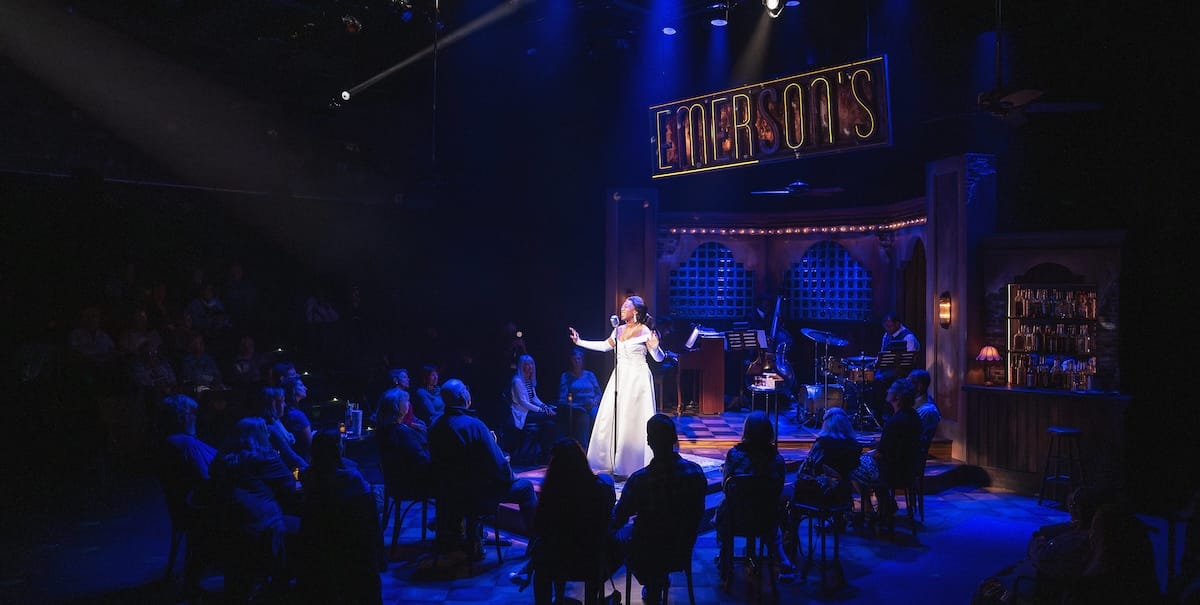
Brian Mallgrave’s set transforms the Arvada Center’s Black Box Theatre into a seedy dive. | Photo: Amanda Tipton Photography
A night with Lady Day
The conceit of the play is simple: The audience is cast as patrons in Emerson’s Bar, gathered for a late set by Holiday. She is led in by pianist Jimmy Powers (played by music director Jodel Charles), wearing shades that indicate she has clearly been drinking, before heading backstage while the band finishes warming up.
Jimmy then introduces Billie to the audience, kicking off a set that combines cabaret banter with fragmented bits of biography and songs that defined her career. Songs like “God Bless the Child” and “Strange Fruit” serve as the evening’s emotional spine, punctuating Billie’s memories of troubled loves, run-ins with the law and all-too-public struggles with addiction.
Musical biographies are tricky: Should the actor channel the exact sound and mannerisms of the historical figure, or interpret them anew? In this production, Essence Anisa Tyler opts for impression, aiming to recreate Holiday’s voice and presence down to the slurred diction of her later years. At times, though, the performance veers uncomfortably close to parody.
Early on, Tyler’s voice sits just a little too high and stylized, creating an accent that never quite feels lived in. As the evening progresses and the character drinks and uses drugs on stage, Tyler’s slurring becomes more pronounced. The trouble is that the effect lands unevenly: Her singing remains clear, but much of her spoken dialogue becomes muffled and indistinct.
Entire stretches of Holiday’s storytelling — about her abusive partner Sonny, her legal troubles or her complicated ties to Philadelphia — were lost to garbled diction. For audience members less familiar with Holiday’s biography, this creates frustrating gaps in the narrative.
It also cuts against the spirit of Robertson’s script, which emphasizes in his author’s note at the start of the script that Holiday’s songs should radiate “joy and humor” as a kind of salvation, even when she’s recounting painful stories. By contrast, this production leans too often into melodrama, weighing down songs that should feel celebratory with visible sorrow and sadness.
Instead of masking her pain with humor, as the script suggests, Holiday’s mask slips too frequently, blunting the impact of her eventual revelations.
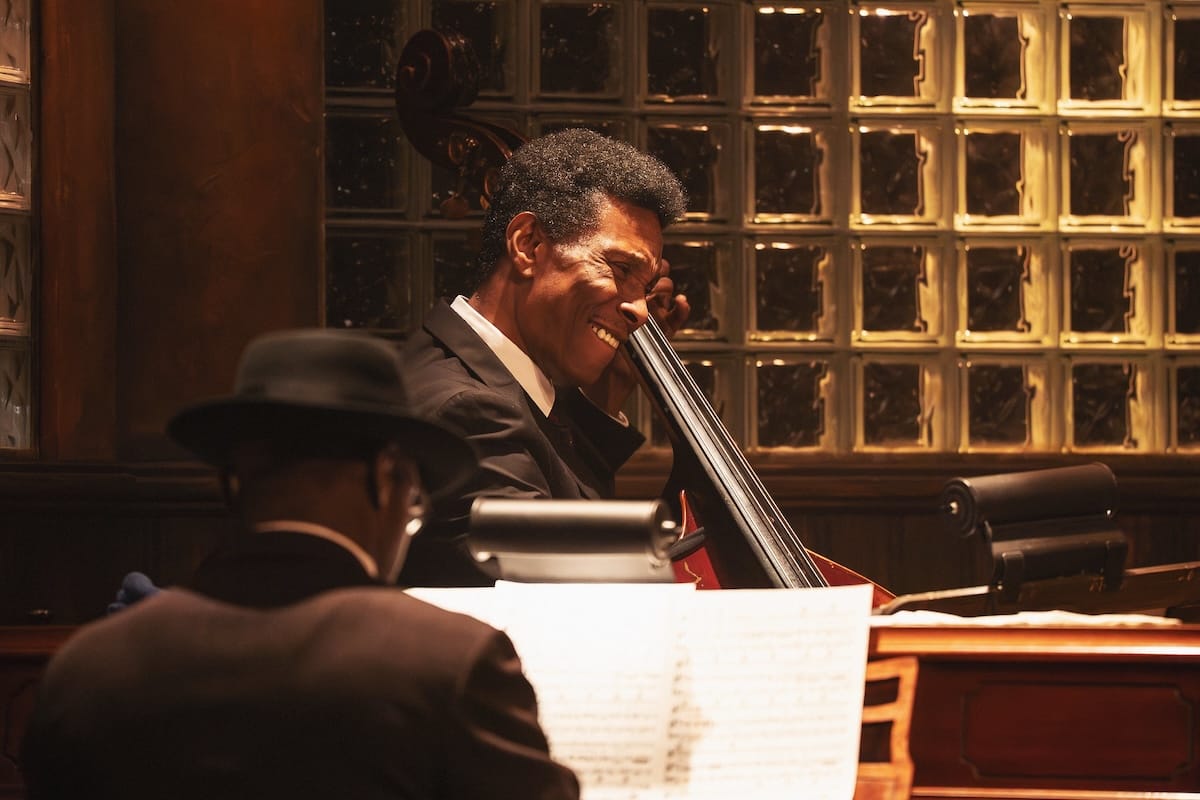
Carl Jackson on bass in ‘Lady Day.’ | Photo: Amanda Tipton Photography
Band and design shine
What keeps the show afloat are its live musicians and production design. Charles is joined by Matt Campbell on drums and Carl Jackson on bass, forming a trio that delivers both lush underscoring and thrilling solos. Their sound is vibrant, authentic and essential to the immersive barroom experience.
Resident scenic designer Brian Mallgrave once again proves indispensable to the Arvada Center. His set skillfully conjures a dingy Philadelphia joint past its prime. Jocelen Barnett Smith’s costumes, wigs and makeup complete the period aesthetic, while Jason Ducat’s sound design balances the intimacy of a small bar with the clarity needed in a theatre setting.
Jon Olson’s lighting design adds nuance, bathing Holiday in moody purples, pinks and blues that underscore each number’s emotional shading. A disco ball even spins into play, heightening moments of fragile glamour. Most strikingly, the lights dim on the band and neon sign whenever Holiday slips into personal anecdotes, isolating her in a harsh spotlight — a visual cue that did its best to sharpen stories that were otherwise hard to catch.
Together, these technical elements wrap the audience in a convincing illusion of time and place.
What undercut that illusion, though, was the staging. Too often, Tyler either stood planted at center stage or drifted listlessly through the cabaret tables, creating a repetitive rhythm that made long stretches of the play feel static. This monotony was especially noticeable during dialogue-heavy passages, where the lack of variety in movement made it harder to stay engaged.
When the focus returned to the music, however, the production came alive. Tyler may not capture Holiday’s singular timbre, but she sings with warmth and conviction, supported by the trio’s impeccable musicianship.
In these moments, when the staging falls away and the music takes over, the show achieves what it promises: a glimpse of Holiday’s genius even as her life slipped away.
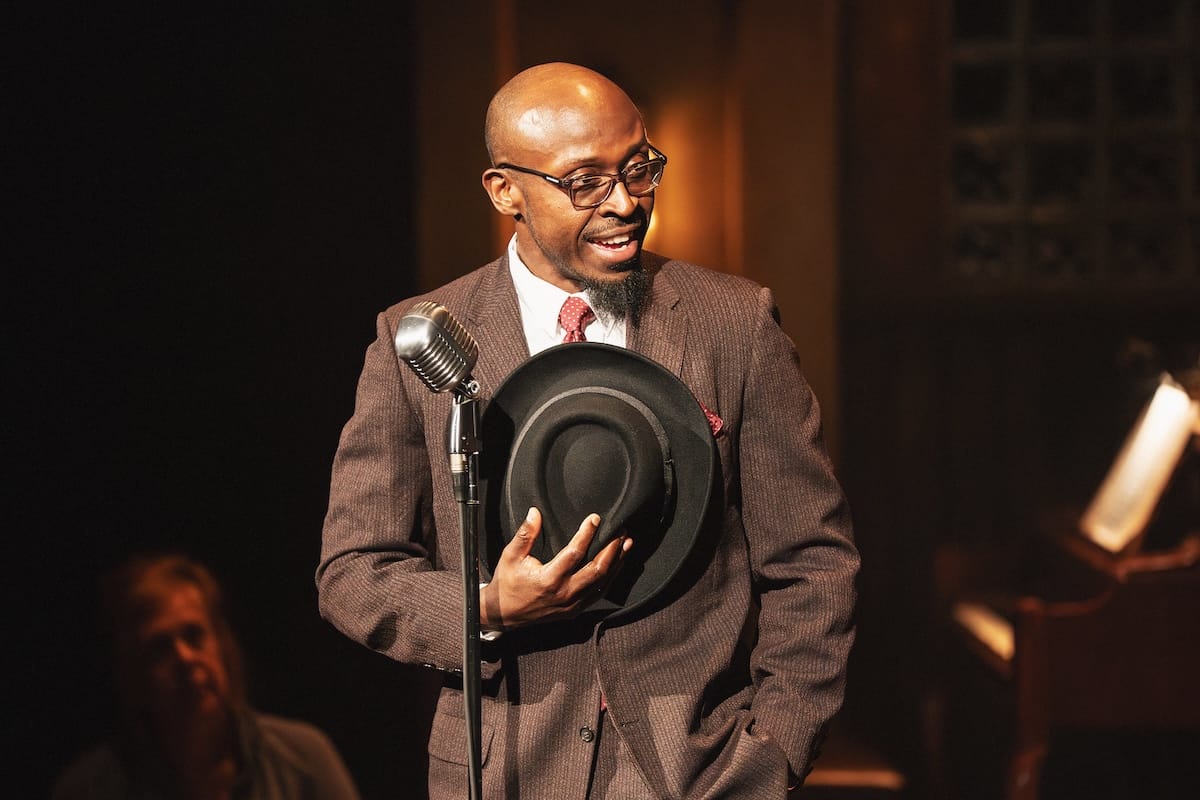
Jodel Charles as Jimmy Powers in ‘Lady Day.’ | Photo: Amanda Tipton Photography
Final impressions
Lady Day at Emerson’s Bar and Grill is a fragile work, teetering between concert and confessional. The Arvada Center production nails the immersive setting and supplies excellent musicianship, but it stumbles in its portrayal of Holiday herself.
By steering too far into sorrow and slurred imitation, the production loses the vital balance of joy and pain the script calls for, leaving the evening more dirge than celebration. And Tyler’s choice to lean heavily into slurred intoxication undermines clarity, leaving the audience in the dark during crucial stretches of the character’s self-revelation. The result is an evening that feels more evocative than illuminating.
For die-hard Billie Holiday fans, the music may be enough. But those seeking a clear-eyed portrait of her struggles and triumphs may find themselves, like the singer onstage, lost in the haze.
A Colorado-based arts reporter originally from Mineola, Texas, who writes about the changing world of theater and culture, with a focus on the financial realities of art production, emerging forms and arts leadership. He’s the Managing Editor of Bucket List Community Cafe, a contributor to Denver Westword and Estes Valley Voice, resident storyteller for the Bonfils-Stanton Foundation and co-host of the OnStage Colorado Podcast. He holds an MBA and an MA in Theatre & Performance Studies from CU Boulder, and his reporting and reviews combine business and artistic expertise.
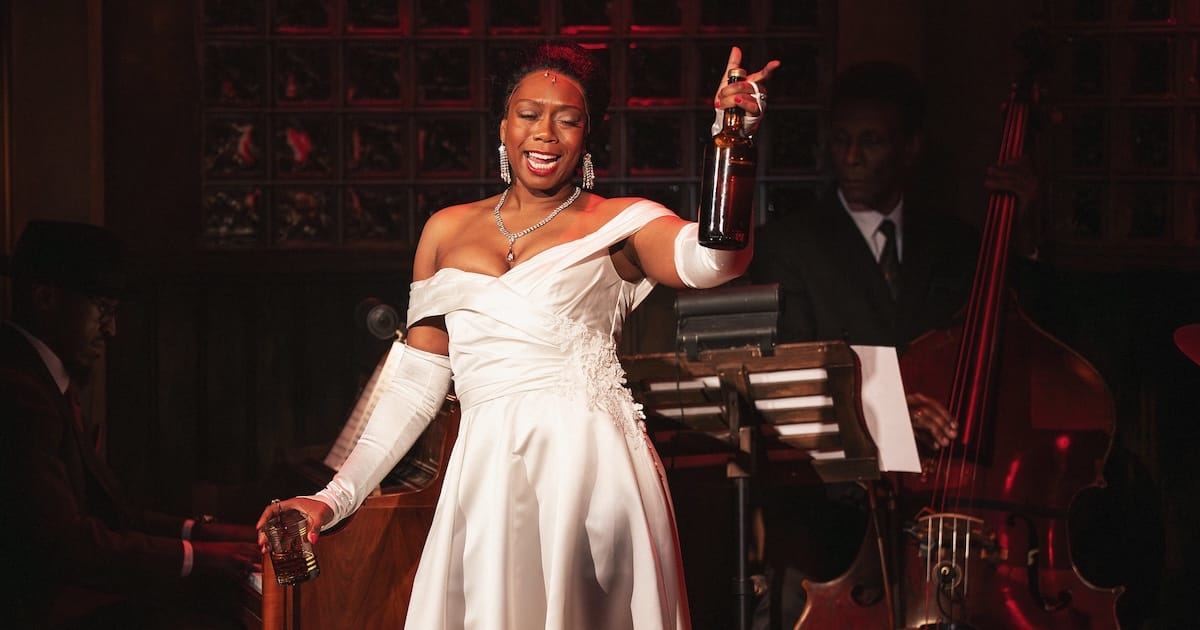

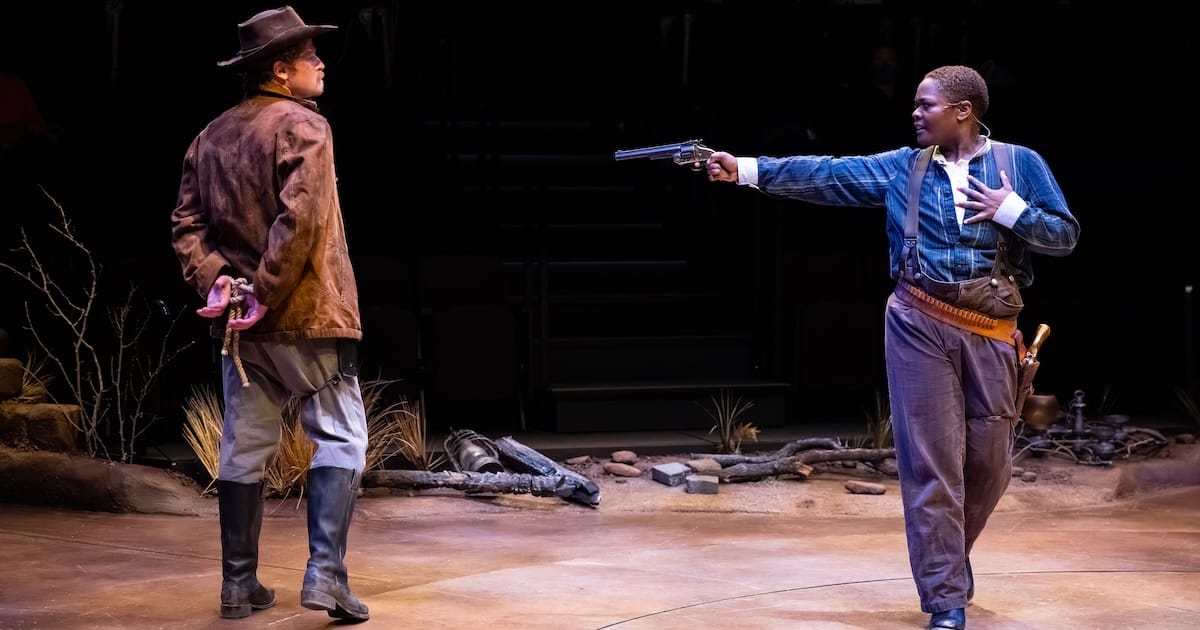
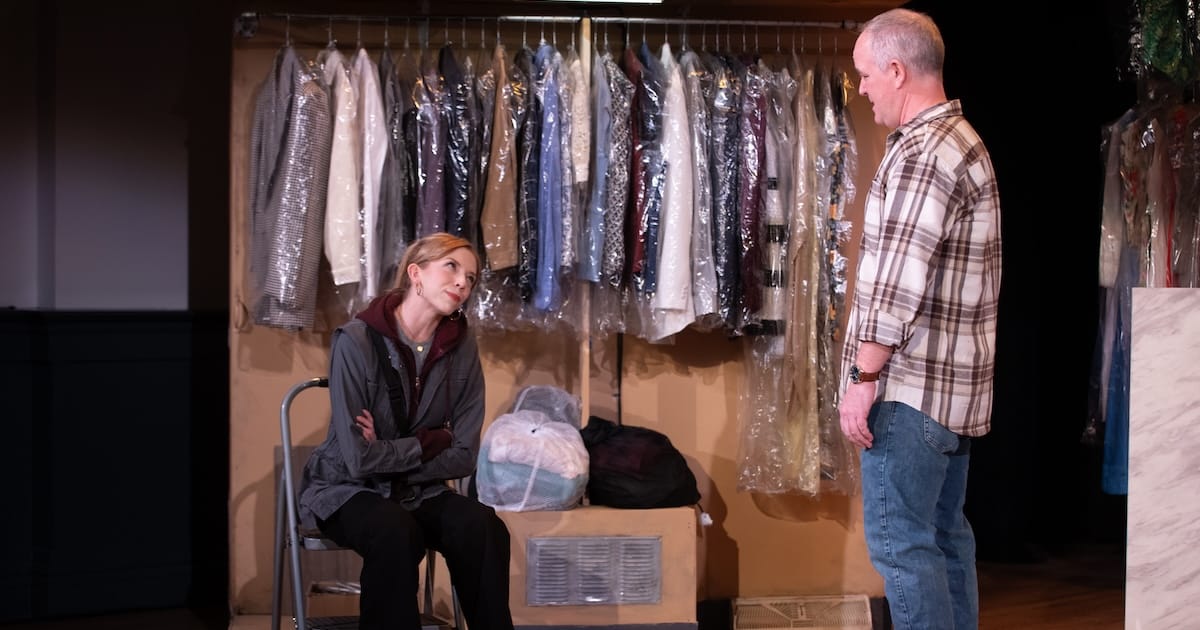
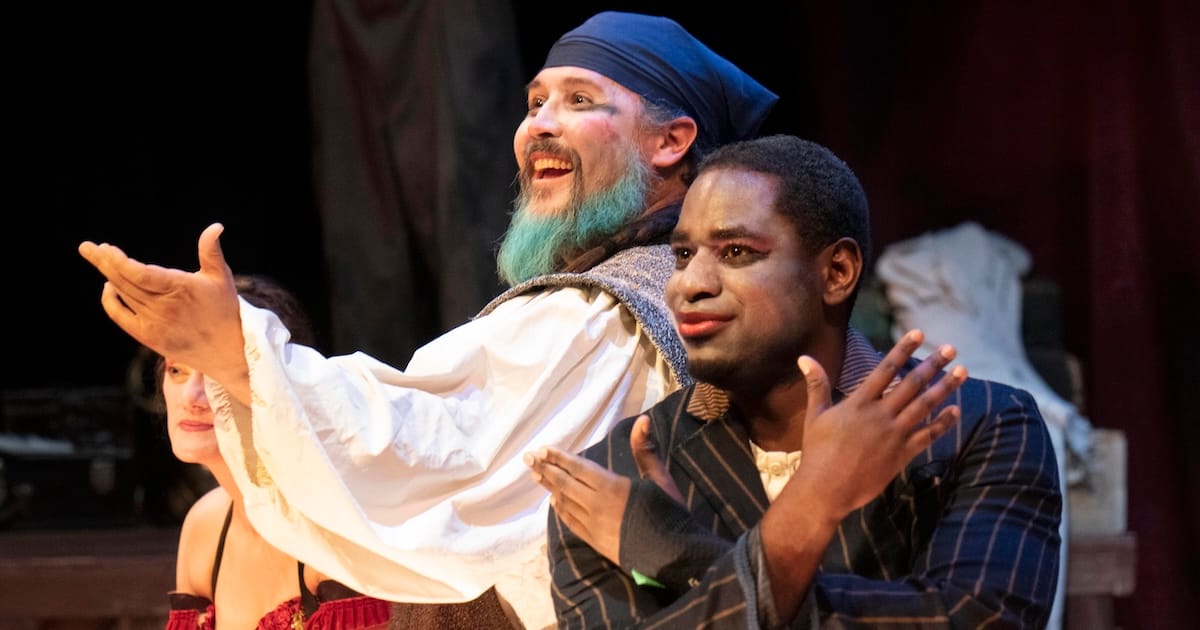

I watched Lady Day at Arvada Center today and while Tyler may do a stylized impression of Holiday- it is not a caricature, but a personal take. I didn’t hear behind the beat phrasing like Holiday had- but what Tyler got right was the personal baggage that clouded Holiday’s life so tragically. The story frames an unimaginably difficult time- and attempts to put the outrageously horrible treatment blacks suffered in a light that is justifiably difficult to celebrate. Beyond the stylish liberties Essence takes, the story itself is something few people can imagine- and the idea of Holiday’s story having to transcend its own built in sadness is unrealistic. The blues, jazz, gospel and folk music created by African Americans gave the dominant culture a huge gift to American culture- which it did little to deserve. This performance too, is a gift of celebrating beautiful music made in the face of hostility, racism, and repugnant treatment. Lanie Robertson shows us the unbelievable amount of pain that somehow smoldered behind the beautiful music. That this performance should not be celebrated for its stark honesty is a tragedy. This production is a triumph in every way. It is too easy to put jazz in an art box, and forget that this box was shielding its innovators only marginally from the hostile world all around it. We should never forget this.
I watched Lady Day at Arvada Center today and while Tyler may do a stylized impression of Holiday- it is not a caricature, but a personal take. I didn’t hear behind the beat phrasing like Holiday had- but what Tyler got right was the personal baggage that clouded Holiday’s life so tragically. The story frames an unimaginably difficult times- and attempts to put the outrageously horrible treatment blacks suffered in a light that is justifiably difficult to celebrate. Beyond the stylish liberties Essence takes, the story itself is something few people can imagine- and the idea of Holiday’s story having to transcend its own built in sadness is unrealistic. The blues, jazz, gospel and folk music created by African Americans gave the dominant culture a huge gift to American culture- which it did little to deserve. This performance too, is a gift of celebrating beautiful music made in the face of hostility, racism, and repugnant treatment. Lanie Robertson shows us the unbelievable amount of pain that somehow smoldered behind the beautiful music. That this performance should not be celebrated for its stark honesty is a tragedy. This production is a triumph in every way. It is too easy to put jazz in an art box, and forget that this box was shielding its innovators only marginally from the hostile world all around it. We should never forget this.